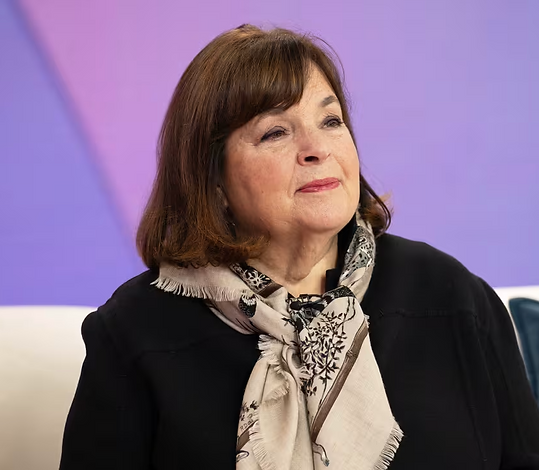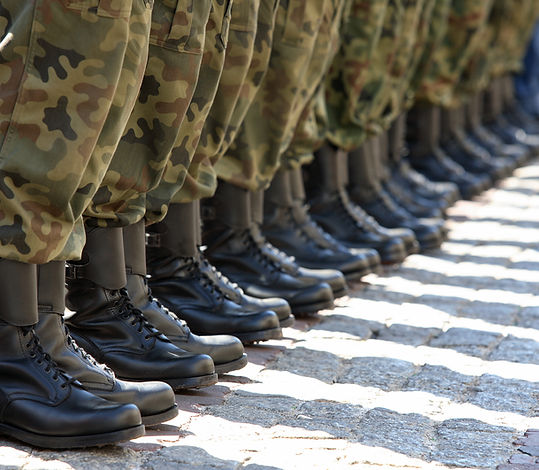

PUBLISHED ARTICLES
I've been lucky enough to have my work published across multiple platforms, giving me experience covering a variety of subjects. Below are a selection of pieces I'm particularly proud of.
For more articles, check out some spots my work has been published: The Daily Beast, NBC News, TODAY.com, Inside Defense, Military Times, Defense News, C4ISRNET, Federal Times, AirForce Times, Army Times and The Eagle.
Capstone Project
During my senior year of my undergraduate education, I wrote an in depth piece on the Miss America Organization. I interviewed contestants and a judge/emcee to write a newsy piece about a topical organization. I wrote this spanning from Fall 2022 to Spring 2023. Although I never published it anywhere, I'm very proud of the work I did for this piece.
The Miss America Organization: Behind the Glitz and Glamour and into the Rebrands, Rule Changes and the Battle for Relevancy
By Georgina DiNardo
Inside Katzen Theater at American University, the harsh spotlights shine down on the 12 finalists hoping to hear their name called as one of the top five candidates for Miss District of Columbia 2022. The only sound filling the contestants' ears in the silent room is the wild beating of their hearts and a faint static noise drowning out all other sound.
Standing in high heels with her back ramrod straight and her blood pressure spiking, Kisa Motiwala, 23, recalled the shiver that enveloped her body after each name called that wasn’t her own.
“The world slows down around you,” Motiwala, the current Miss DC Volunteer, said. “That's the moment that you most vividly remember. I remember the face of every single girl that you're up on that stage with, every single girl that you're holding hands with, every single person that's standing out in the crowd with the bright lights.”
Sonya Gavankar, Miss DC 1997 and the Miss DC emcee at Motiwala’s competition, is handed a list of the five finalists, one of whom will represent the District for a year and participate in the next Miss America competition. Bursts of applause ring through the silence as each finalist's name is read out. When only one name is left to read, the tension in the room is palpable. She pauses.
“When I'm handed the piece of paper, I actually don't look,” Gavankar, 46, said. “I look to see that there are names that are legible in all the positions and then I don't look at it again, because I don't want to give anything away to anybody.”
When Alivia Roberts is finally named the winner of the Miss DC 2022 competition, she becomes part of the glamorous image the Miss America Organization projects to the world. But that image of beauty, grace and sophistication has been tarnished in recent years amid sexist accusations and leaked email scandals from high ranking officials, including the former CEO. As difficult as those challenges are, the biggest is the organization's battle to stay relevant in a world that no longer values the Miss America pageant as it once did.
In 2017, the program drew an audience of 5.35 million viewers. In 2018, the number dropped to 4.34 million. Continuing the downward trend, the Miss America 2019 finale drew an audience of 3.6 million people, hitting an all time low for the competition. With viewership dwindling, the future of Miss America remains uncertain. A program that attracted 27 million viewers when it first was aired live in 1954, struggles to retain its audience today.
“I think that right now there's such a focus on trying to make Miss America relevant and trying to make sure that they're seen in culture as progressive and moving forward,” Jacqueline Thomas, Miss Arizona 2019, said. “But, I don't think that the general culture of America is Miss America's target audience.”
The Miss America Organization denied request for comment.
To address the challenges, Miss America unveiled a new version of itself in September 2018 called Miss America 2.0. The swimsuit competition was replaced with a social impact section, which included a live interview with judges, emphasizing articulate candidates, their passions and what they would like to accomplish as Miss America. In the past few years, a myriad of new CEOs have taken over the competition and moved it in different directions. This rebranding changes the entire image from a beauty pageant, to a scholarship program that focused on empowering female leaders.
Removing the swimsuit competition caused mixed feelings internally among the contestants. Roberts, who ended up being crowned Miss DC 2022, competed in the Miss America Organization before its repeal of the swimsuit competition and after.
Roberts said the event put more strain on her mental health.
“I did not like competing in swimsuit,” she said. “I often found myself preparing for swimsuit much harder and more strenuously than other phases of competition.”
On the other hand, Thomas, 28, liked the swimsuit portion as it made her feel healthy, more mentally alert and had the ability to empower women.
“I was all for more of the business woman aspect of Miss America 2.0,” Thomas said. “But I think with removing the swimsuit, we lost some of that discipline and focus as it relates to being holistically healthy and taking care of your body physically, emotionally, spiritually and mentally.”
Gavankar also has experience competing in and judging swimsuit competitions herself and has her own take on it.
“I think that there are women who don't want to be judged literally in shoes and a swimsuit standing on stage under lights with a spray tan on,” Gavankar said. “I want to choose somebody healthy enough to do the rigorous job of Miss America. But I don't think that needs to be done in a swimsuit. I don't think that needs to be done in an onstage portion of the competition, I think there are different ways of assessing a woman's health and for that matter, mental health.”
This year, the Miss America Organization is making a shift from Miss America 2.0 to a currently unnamed version. While little information is publicly known, former contestants Motiwala, Gavankar, Thomas and Roberts, all speak to the elimination of the new social impact portion and the addition of a health and fitness aspect.
“They are actually bringing back the health and fitness component, not as swimsuit, but as athleisure,” Motiwala said. “So health and fitness is athletic wear, it’s athleisure. So it’s like a sports bra and either leggings or biker shorts. But they haven’t fully given any direction on that so we are all kind of in the same boat of this is just what we know.”
With the details of this new version still unclear, frustration has been sparked amongst former contestants about the lack of communication with stakeholders.
“I really would like to see the Miss America Organization get better at communicating their changes, their intentions and also asking questions among their most important stakeholders before they implement these wide sweeping changes,” Thomas said.
Some consider the new health and fitness component an attempt to solve the loss of viewers. When the swimsuit portion was repealed in 2018, a huge drop in viewership happened, including a loss of one million viewers from 2017 to 2018. By adding in a health and fitness portion, the competition seems to be trying to strike a compromise between traditional values of beauty, physique, and looks and modernizing the competition to fit with today’s standards of impact, knowledge and identity.
However, viewership is not the only struggle Miss America is facing. On top of changing with the times, the Organization has had an onslaught of scandals that create a stigma for the Organization itself. The sexist accusations against the organization, which were only further proved from former Miss America CEO Sam Haskell’s leaked emails fat-shaming and slut-shaming contestants, have not helped to improve the organization's image.
With these events happening in recent years, the image of the Miss America Organization has been different than it once was during its initial inception.
The first Miss DC was crowned in 1921 and after over 100 years of continuing this competition, the Miss America Organization has changed and revamped its image after years of controversy to fit with the times. Since the competition's creation, the Miss America crown has had four points, each representing service, style, scholarship and success. The pageant holds those four points as its core values that winners must uphold and represent, but as society becomes more progressive, the Miss America Organization has become less accepted by the general public.
“I think really getting back to the founding principles of why Miss America was created, what we're here to do, what the main purpose of the four points of the crown are and the fundamental values of the Organization is important before recalibrating any other changes,” Thomas said.
By taking away the social impact portion and adding in a health and fitness section, the Miss America Organization seems to be reverting back to its old ways, by highlighting the importance of beauty and looks over talent and impact.
The first requirements listed in the Miss DC 2020 contestant handbook are “highly articulate, attractive and talented.” However, the focus on looks does not end there. The list of requirements for the woman selected to be Miss District of Columbia says “she must look like a glamorous woman” and that a contestant “must look like her picture and be able to do that on her own.” While the requirements do focus on other attributes they look for in Miss DC, physical attractiveness is still a large part of the organization’s view of a woman. By including the health and fitness component as part of the competition, a stronger emphasis is being placed on looks and the Organization is taking a step backwards in its fight against sexism.
The future of the Miss America Organization is currently uncertain, with new leadership in charge, the direction of Miss America is unclear. The alarming drop in viewership against today’s modernization seems to be the largest problem for the organization, making it revert back to a competition that, while not swimsuit, still highlights looks and attractiveness over empowering female leaders.
“I've literally competed in every phase that they've had, other than this new one now that they're adding back in,” Roberts said. “And I am glad to see that they're bringing it back. But I’m glad it’s not so extreme where young women think they have to starve themselves or they have to have a perfect body. I'm really glad that it's emphasizing more of a healthy lifestyle and healthy living.”
Author’s note: Georgina DiNardo competed in the preliminary stages of Miss DC 2020, but dropped out due to the coronavirus pandemic before any on-stage competition portions.

























